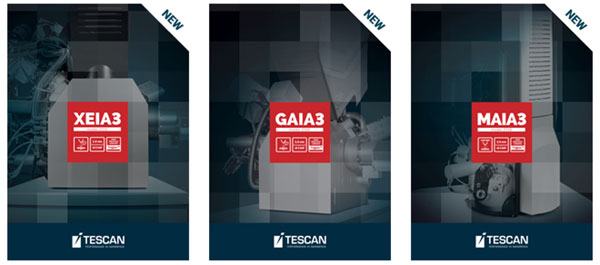TESCAN Raise the Bar in Ultra-High Resolution Electron Microscopy
TESCAN – leading global company in the field of charged particle optics and electron microscopy, is releasing Triglav; the next generation of its ultra-high resolution (UHR) electron column technology with a significant improvement in quality imaging and analytical capabilities. The Triglavcolumn equipped with unique electron optics and a robust detection system achieves uncompromised ultra-high resolution for resolving nano-sized features in samples and provides enhanced surface sensitivity and image contrast at low beam energies.
The formal presentation of the new column technology is taking place at the Microscopy & Microanalysis conference in Columbus, Ohio, USA where the new XEIA3 and GAIA3 – 2016 models fitted with the Triglav column will be available for the live demonstrations.
We have completely redesigned our UHR column improving the resolution by 30%, achieving sub-nanometre resolution of 0.7 nm at 15 keV and an impressive 1 nm at 1 keV. In addition, the analytical potential has been significantly improved resulting in an excellent performance in the field-free mode, said Jaroslav Jirue, the head of R&D Physics in TESCAN. Triglav column is based on the three objective lenses whose combination results in different imaging modes. The column is equipped with a universal detection system consisting of multiple SE and angle-selective BSE detectors for maximum surface and compositional contrast. Furthermore, the geometry of the column has also been redesigned allowing larger samples to be analysed. This is particularly relevant to the semiconductor industry as large wafers can be accommodated for their analysis, added Jirue.
UHR imaging is an essential capability for the semiconductor industry and is critical in performing routine root failure analysis in state-of-the-art technology nodes and multi-layered optical devices, or, defect characterization on wafers at known locations. In materials science, the characterisation of nanowires and nanotubes is a challenging task that requires UHR in order to resolve the features of interest in such materials. UHR allows researchers to examine the detail of the ultrastructures of cell and tissue biology. While the outstanding imaging capabilities of the Triglav column excel in the entire range of accelerating voltages, it is the ultimate resolution and performance at low beam energies that makes this column ideal for imaging nonconductive and beam-sensitive samples.
The new UHR column technology is now an integral part of the TESCAN UHR family systems model 2016: MAIA3 a UHR SEM, and,GAIA3 and XEIA3 both FIB-SEM systems equipped with Ga and Xe plasma ion source FIB column respectively.
 Posted July 21, 2016
Posted July 21, 2016


